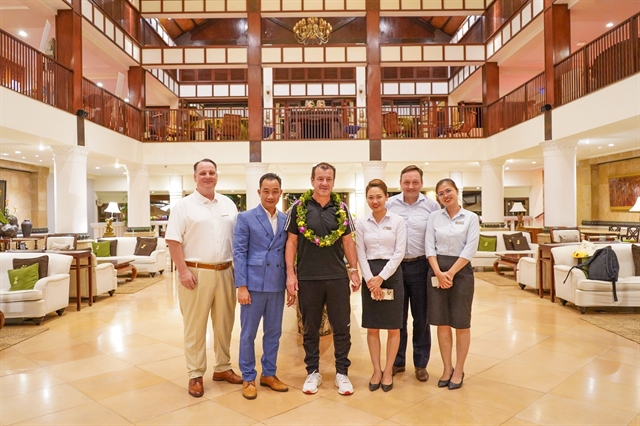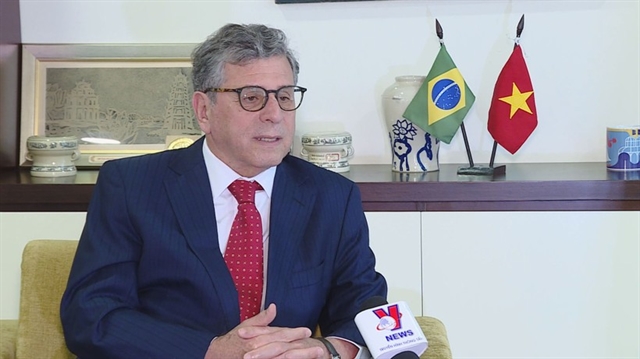 Sports
Sports

 |
| Brazilian Ambassador to Việt Nam Marco Farani. — VNA/VNS Photo |
Since Việt Nam and Brazil established their diplomatic relations on May 8, 1989, the two sides have enjoyed strong expansion in bilateral partnership in all fields from politics, diplomacy and defence to economy, culture and people-to-people exchange.
On the 35th anniversary of Việt Nam-Brazil diplomatic ties, Brazilian Ambassador to Việt Nam Marco Farani talked to Vietnam News Agency on the development and future prospects of the relationship between the two countries.
Việt Nam and Brazil are celebrating the 35th anniversary of bilateral diplomatic relations this year. How would you assess the development of the all-round cooperation between the two countries?
The 35th anniversary of bilateral diplomatic relations comes at a very auspicious moment, when Brazil and Việt Nam are strengthening and deepening our friendship and cooperation ties. President Luiz Inacio Lula da Silva has decided that one of the hallmarks of his third term, which started last year, would be the renovated commitment of Brazil with our traditional foreign policy stance – a stance that, just like Việt Nam’s, promotes independence and self-reliance, alongside friendship with every nation in the globe, in order to help build world peace and prosperity.
The visit of Prime Minister Phạm Minh Chính to Brazil, last September, was promptly followed by the visit of our Foreign Affairs Minister, Mauro Vieira, to Hà Nội this April. This sequence demonstrates the new momentum the bilateral relationship is gaining. In November, Prime Minister Phạm Minh Chính is expected to return to Brazil, this time for the G20 Summit of Heads of Government, for which he has been invited by President Lula himself. Additionally, President Lula intends to come to Việt Nam as soon as possible, maybe even this year – if his very busy schedule allows him, since we hold municipal elections in Brazil in October. Last year, Brazil hosted the 9th edition of our traditional Bilateral Joint Commission on Political Affairs.
Allow me to underline that this resuming of exchanges in the highest level is not an end in and of itself: it is the foundation on which we aim to deliver very concrete benefits to both our countries, be it in trade, political concertation or other areas of cooperation.
The 35th anniversary of the Việt Nam-Brazil diplomatic relations is a new milestone in the development of the bilateral partnership. What are the major areas that the two countries should focus on to further foster bilateral ties in the coming time?
The first area I would like to emphasise is agriculture. Last year, on the occasion of Vietnamese PM’s visit to Brasília, we signed a Memorandum of Understanding on agriculture. Based on this MoU, an action plan was developed, which allows for a permanent mechanism of technical consultations. The common goal is to facilitate the opening of markets and the identification of new trade opportunities for both countries. The Vice-Minister of Agriculture of Brazil, Roberto Perosa, visited Hà Nội last march. We are working closely with MARD (Việt Nam’s Ministry of Agriculture and Rural Development) and hope to be able to announce mutually beneficial measures and, hopefully, the opening of markets for new Brazilian and Vietnamese products very soon.
The second promising area is defence. Also during PM Chính’s visit to Brasília, we signed a bilateral framework agreement on the matter. Our Ministries of Defence are negotiating a 3-year working plan and discussing potential areas of cooperation. Brazil and Việt Nam are both interested in the diversification of supply chains and in the developing of indigenous industries of defence products. I believe we will have a lot to talk about in this area. On that note, the Brazilian Association of Industries of Defence - ABIND is going to be present at the Việt Nam International Defence Expo 2024. EMBRAER, the Brazilian aerospace industry that is the third largest in the world, will also be present at the Expo. Since this event will celebrate the 80th anniversary of the Việt Nam People’s Army, we are hoping to bring some high-ranking Brazilian official to the fair.
The third area would be Science and Technology. Our Minister of Science and Technology, Luciana Santos, has visited Việt Nam last year. She is President of PC do B, Brazil’s Communist Party, which is part of President Lula’s governing coalition. PC do B has a longstanding political relationship with the Communist Party of Việt Nam. We hope to explore this convergence and the tenure of Minister Luciana Santos as Head of the S&T portfolio to promote cooperation between Brazil and Việt Nam in this area. By the end of May, a technical delegation of Brazil’s Ministry of Science and Technology will come to Hà Nội to identify areas of mutual interest for cooperation.
The fourth area I’d like to highlight is renewable energy. Brazil and Việt Nam are strongly committed to the environmental agenda and are both leaders in our respective regions in the process of energy transition. Brazil has the cleanest energy matrix on the planet: 80 per cent of the energy we consume comes from renewable sources, like hydropower, wind, solar and biomass. Last month, during the visit of Foreign Minister Mauro Vieira to Hà Nội, the Embassy organised a seminar on biofuels, called Ethanol Talks. Brazil has a very successful experience in the field of biofuels, one that could be shared and replicated in Việt Nam. The associations of Brazil’s ethanol private sector, UNICA and APLA, spoke at the seminar and are willing to explore opportunities with their Vietnamese counterparts.
Personally, I see a lot of potential for cooperation in the field of sports. Brazil, as everyone knows, has a lot to offer in this area, especially regarding football, a passion Brazilian and Vietnamese people’s share. And since we are talking about cooperation, let me disclose that a bilateral framework Agreement on Technical Cooperation is almost finalised; once such agreement is signed, a myriad of possibilities will be opened.
I could also talk about the cultural and educational aspects of our friendship and cooperation, but this answer is getting too long. Let me just highlight three upcoming events that the Brazilian Embassy will promote this year: the exposition of acclaimed Brazilian painter Marianita Luzzati; the concert of Cristian Budu, a famous Brazilian piano player, alongside the Sun Group orchestra; and the presentation of Diego Figueiredo, a popular guitar player, during the celebrations of Brazilian Independence Day, next September.
Brazil has been the largest trade partner of Việt Nam in Latin America with two-way trade hitting more than US$7 billion in 2023. What should the two countries do to further promote their sound economic partnership to match the potential and strengths of both sides?
President Lula and PM Chính have discussed at length the perspectives for our commercial relationship. It is our mutual understanding that there is a lot of potential for further growth. Both leaders agreed to work towards increasing the two-way trade to US$10 billion until 2030. Ours is a very balanced commercial partnership: both countries sell roughly as much as they buy. There is no large surplus in favour of any of the partners – so it is clearly mutually beneficial to improve the flux of trade between our countries.
With this objective in mind, in mid-March the Brazilian Embassy and the Brazilian Trade Promotion Agency – APEx organised a multisectoral business mission to Hà Nội. Brazilian businessmen from various fields, from agriculture to pharmaceuticals, came to Hà Nội, held meetings with their counterparts and took part in a Business Seminar hosted by the Embassy. With initiatives such as these, we intend to facilitate contacts between the private sector and allow trade volume to increase.
Furthermore, the smooth relationship between our countries at the political level and the absence of any sort of irritant or pending problem in our bilateral relations is a factor that contributes to the steady increase of trade.
How do you assess the coordination between Việt Nam and Brazil at multilateral forums, especially when Brazil is performing the role of G20 presidency for 2024?
Brazil and Việt Nam’s foreign policies share the same principles. We are both committed to multilateralism, to the promotion of peace, to the peaceful solution of controversies and to the upholding of International Law. Given this framework, I believe cooperation between both countries in multilateral fora happens almost naturally. It is not casual that Brazil and Việt Nam have been supporting each other’s candidacies to many multilateral bodies and have been working together in many important issues.
Brazil holds the G20 presidency this year in a very fortunate context: the presidency of the Group of 20 passed from one large developing economy to another. First Indonesia, then India, now Brazil and in December we are going to pass the baton to South Africa. Always building on the work of the previous presidencies, together we are highlighting the issues that matter the most to the Global South, making the voice – and the plights – of developing countries heard. The Brazilian government chose three focus themes for our G20 presidency: the eradication of poverty and hunger; climate change; and the reform of multilateral institutions. Việt Nam was invited by the Brazilian presidency to join the discussions at the highest level: A Vietnamese delegation is already taking part on the meetings of the agriculture track and our Foreign Minister, Mauro Vieira, has personally delivered President Lula’s invitation for PM Phạm Minh Chính to take part in the G20 Summit of Heads of State, in November.
In 2025, Brazil will host the BRICS Summit and the COP 30. Being a signatory of the United Nations Framework Convention on Climate Change, Việt Nam will join the discussions on this most important forum on environmental issues. The COP 30 Summit will be held in the city of Belém, in the heart of the Brazilian Amazon. Brazil is really interested in coordinating efforts with countries with large tropical forests in Asia and Africa, such as Việt Nam. Just like other developing countries, Việt Nam and Brazil are interested in pushing forward for better sources of financing for the energy transition, mitigation and adaptation to climate change. We are natural partners in environmental discussions as well. — VNS




